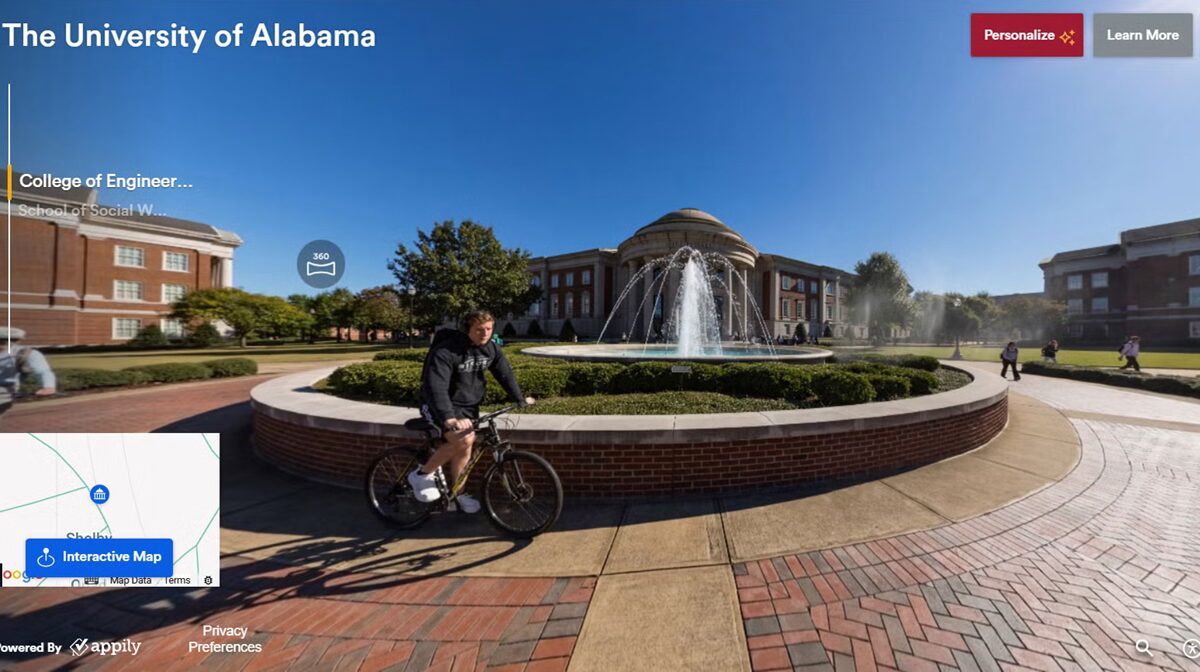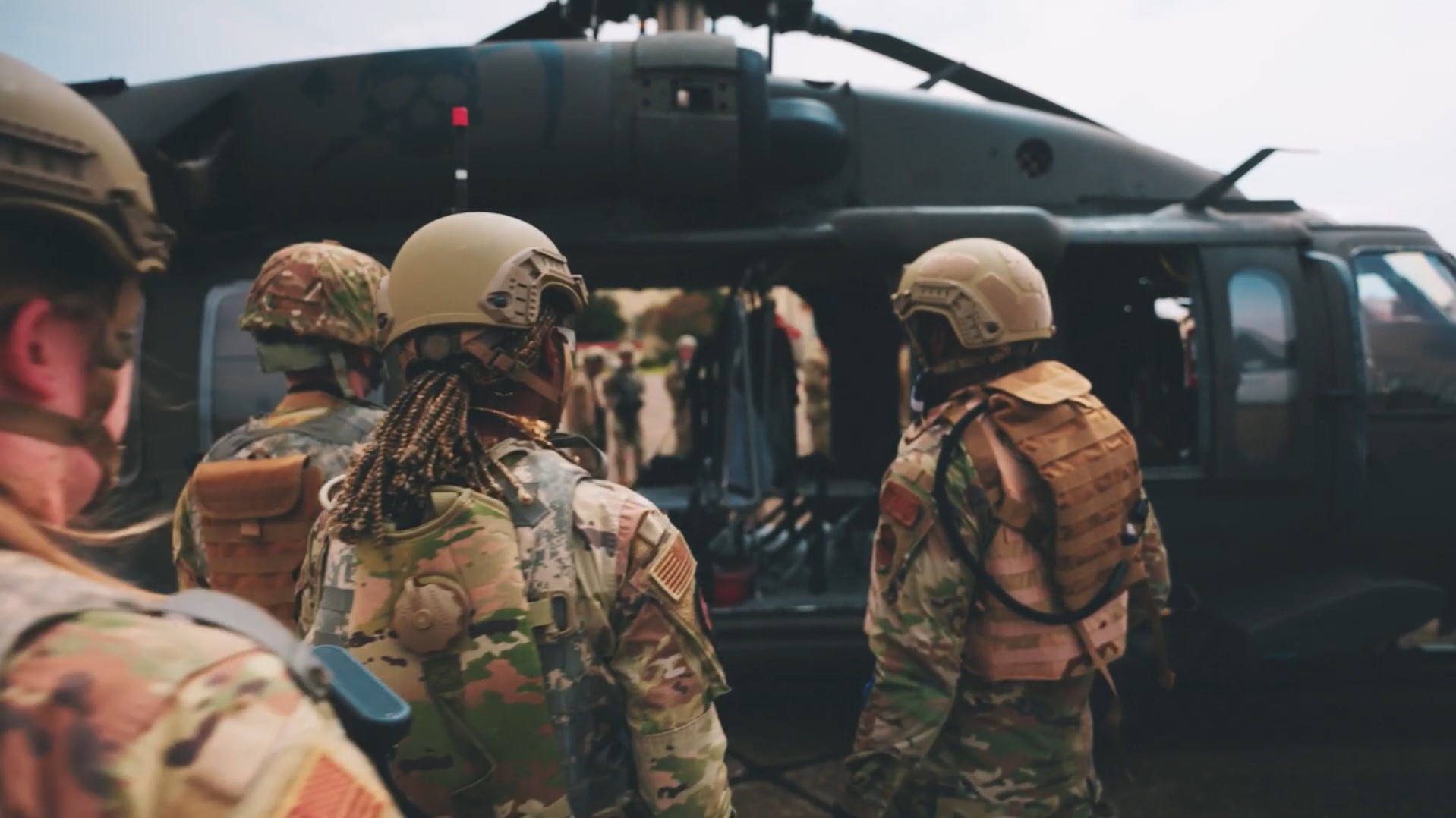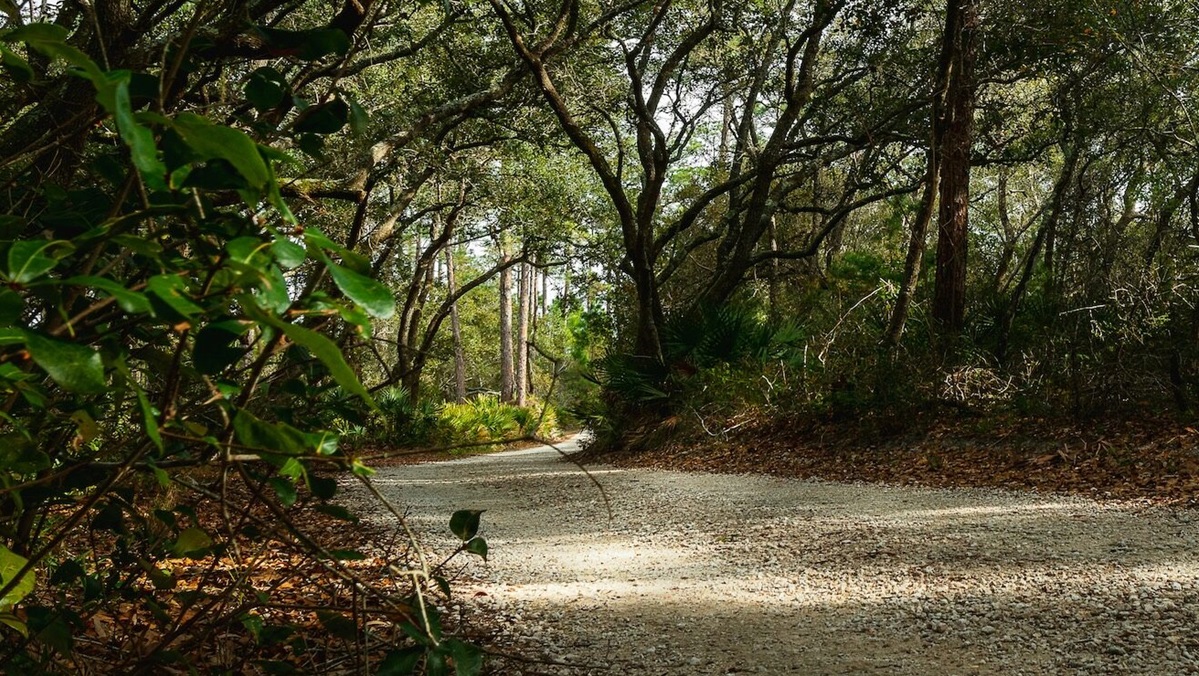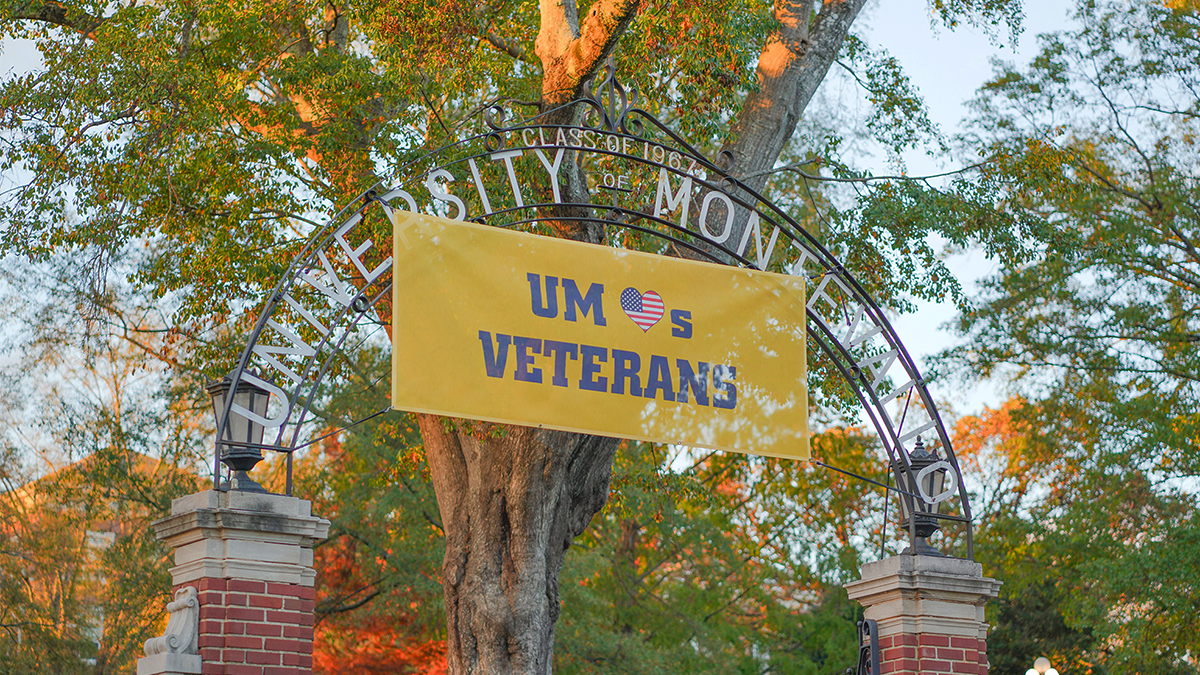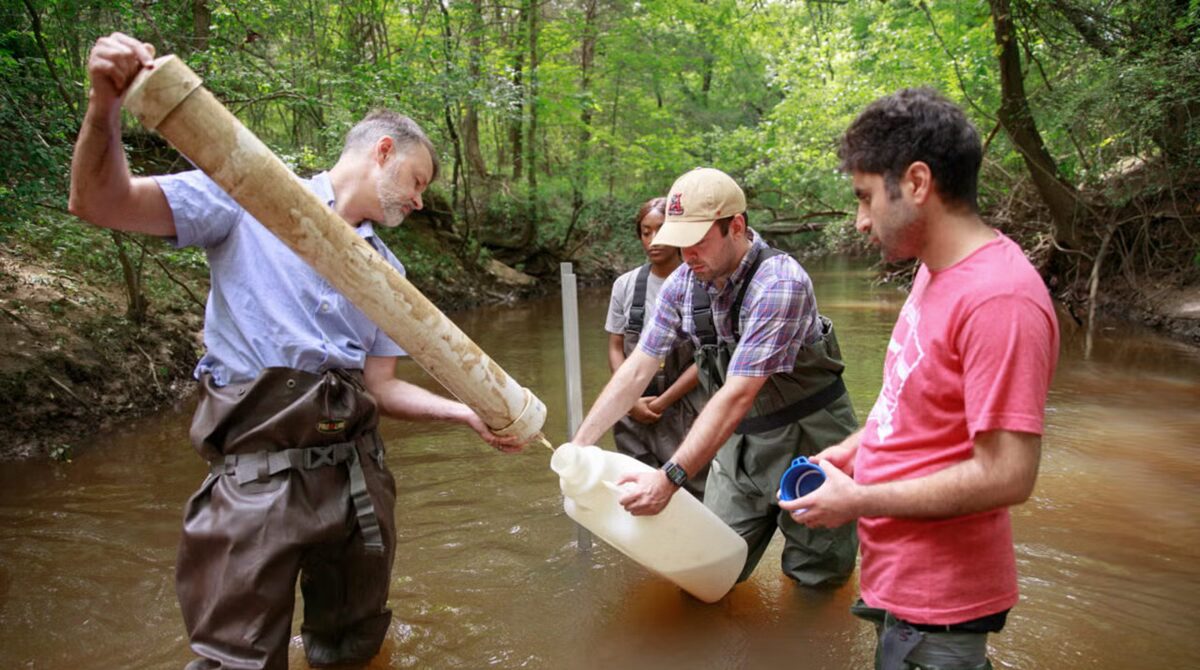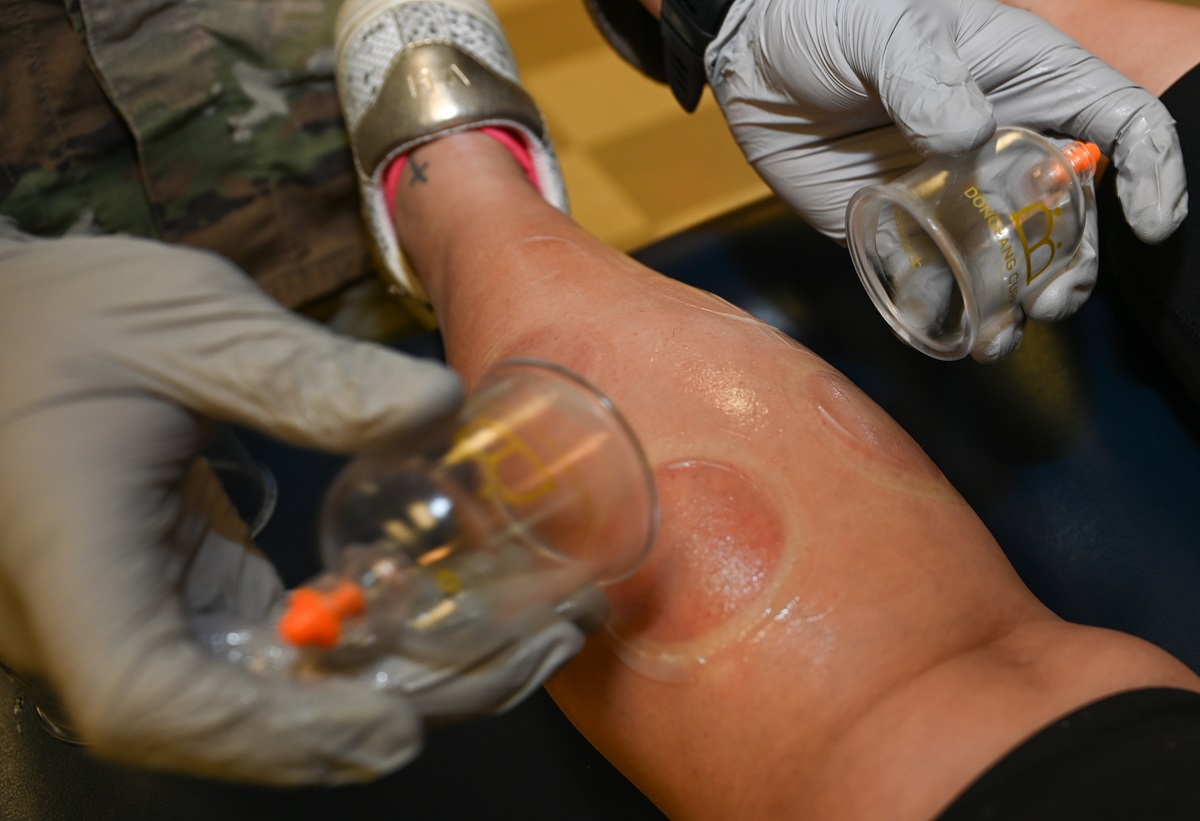Jasper is a jewel being polished in Alabama

Downtown Jasper is the heart of the renaissance taking place in this Walker County city. (Meg McKinney / Alabama NewsCenter)
There was a time when Jasper was home to some of America’s most famous people. The Bankheads, Carl Elliot, Tom Bevill and George “Goober” Lindsey all lived in this town of about 14,000 people amidst one of the world’s largest coalfields.
Those stars are all gone as Walker County’s seat of government is undergoing a revolution that has nothing to do with the black rock that first brought workers and entrepreneurs here nearly 200 years ago. It has everything to do with making downtown a diamond.

Greg and Lindsey Kilgore opened Black Rock Bistro in Jasper after Hurricane Katrina forced them out of New Orleans. (file)
The sound of sledgehammers, dump trucks, backhoes, concrete mixers and other industrial equipment is constant around the county courthouse, city hall and law offices that occupy much of downtown. As Jasper spreads out toward the massive new six-lane Interstate Highway 22 that skirts the city and reaches Memphis, it also is enticing people back to the old sections of town.
Rather than meeting at one of the familiar fast food joints, Jasperites are frequently heading downtown to Warehouse 3 Nineteen, Los Reyes or Black Rock Bistro, which was lauded by New York magazine as a must-see restaurant in Alabama, and the Alabama Cattlemen’s Association says has “Bama’s Best Burger.”
Toward the weekend, folks often head to one of the new beer establishments: Twisted Barley Brewing Co. or Tallulah Brewing Co. Both are getting rave reviews from locals and outsiders. A few years ago, the sidewalks were empty after 5 p.m. Now it’s hard to find a parking place at 10 p.m. on Thursday, Friday and Saturday.
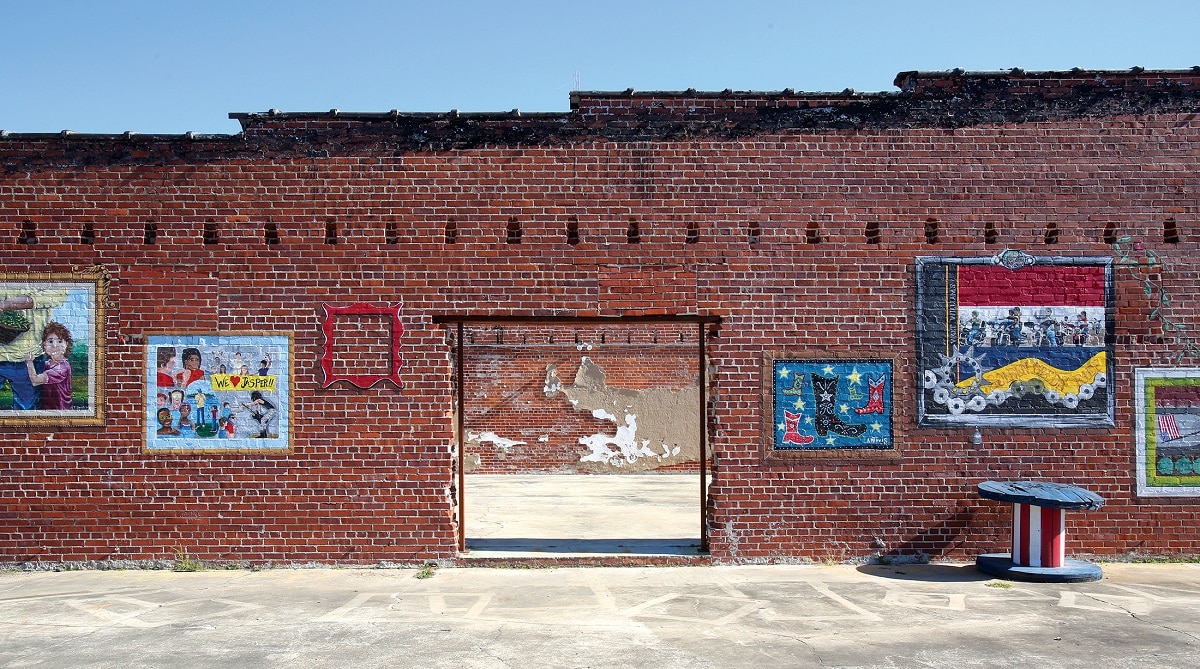
Jasper is seeing a rebirth. (Meg McKinney / Alabama NewsCenter)
Downtown Jasper is like the old city center so common across America 50 or 100 years ago. There are no parking meters and few traffic lights. Almost every intersection is a four-way stop.
Young Jewelers, perhaps the oldest continuously operating business in Jasper, has engagement photos of couples in its new front windows. Across the street, teenagers meet inside a renovated two-story building that houses the new First United Methodist Church Youth Center. They play games in the fenced grass lot next door, reminiscent of a time when children’s noses weren’t always planted on iPads.
Many of those kids are learning in the respected city school system, including at the new $53 million Jasper High School that has high-speed wireless technology in its 61 classrooms serving 850 students. Memorial Park Elementary last year became a National Blue Ribbon School.
Other community events, such as fundraising plays like “Steel Magnolias,” are performed in the spacious Jasper Civic Center, which is headquarters for several important local organizations in a town that is an Alabama Community of Excellence and has been a U.S. Tree City since 1988.
The past five years have seen the revival of the Foothills Festival each September, attracting up to 25,000 people for free carnival rides and big-time bands, such as the Spin Doctors last year, on the city square. There is also Art in the Park in May and Dinner in the Park in the fall.
Four years ago, Jasper became the nation’s second city hosting an urban disc golf tournament. The Downtown Throwdown brings standout Frisbee tossers from across the country for two days while the heart of the business district is blocked off from vehicle traffic.
Natatorium important asset
Memorial Park’s many segments spanning four city blocks are the crown jewels of Jasper’s public facilities, providing adjacent fenced baseball, softball and soccer fields, the George Lindsey Dream Field, Swann Gymnasium, Jasper Senior Center, a handicapped-accessible playground and other popular venues surrounding a pond. The Natatorium is the showpiece of the park dedicated in 1949 to soldiers who made the ultimate sacrifice, including 200 from Jasper in World War II.
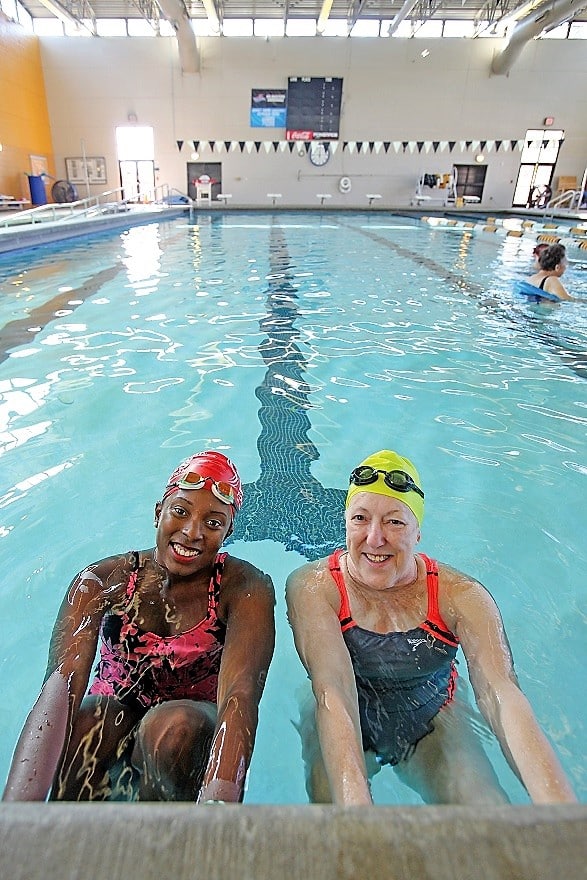
Whitney Dyer and Brenda Arnold enjoy swimming laps at the Jasper Natatorium. (Meg McKinney / Alabama NewsCenter)
Opened in 2003 on the former site of an outdoor pool enjoyed by locals for decades, the Natatorium is a multi-use facility that incorporates the original bathhouse building into a tall structure that houses the seven-lane, 8-foot-deep, 25-yard-long pool. Thousands of swimmers visit each year to compete, do aerobics, dance, celebrate birthdays or just take a dip in the warm water after the weather turns cold.
Natatorium Director Stacy Smothers wasn’t even a year old when she learned to swim in the old pool. She’s been working at the newer $3 million facility since the day it opened, taking her current post a decade ago. It costs about $500,000 a year to maintain and staff the Natatorium and adjoining outdoor pool, paid in part through a $2 daily fee for kids ($3 for adults).
Jasper’s swim team had more than 100 members last summer, many who hope to mirror the success of Chloe Bennett, who learned to swim there at age 7 and became an All-American swimmer at Delta State.
The Natatorium is a special place for special-needs people, with different groups from the region visiting each week for the fun and health benefits.
The annual Jasper Special Olympics, hosting more than 150 athletes from across Alabama, is among the most popular meets in the state.
Yet, Smothers says saving lives is the most important mission of the Natatorium. The No. 1 cause of death for children under 4 is drowning. That problem is addressed through swimming classes beginning at 9 months. Smothers saw a similar need in 2016 when she started a program for grownups. More than 60 adults, up to age 84, learned to swim at the Natatorium last year.
Smothers walks around the pool watching Whitney Dyer swimming fast laps. The next lane over, Brenda Arnold is keeping pace. Not long ago, neither woman could swim. Now they swim competitively.
“When I first started, I was terrified of deep water,” says Dyer, an attorney in Corner, located between Birmingham and Jasper. “It became a self-esteem issue. As a child, my family didn’t swim. I didn’t know what a natatorium was. We didn’t have that where I grew up in Tennessee.”
An accomplished athlete and sprinter at Miles College, Dyer “always wanted to swim.” Her three children, ages 11, 8 and 4, learned at the Natatorium, which encouraged Dyer to take the leap. She met Arnold, who started teaching beginning swimmers four years ago after progressing herself from dog-paddling. The teacher and the student have become one another’s biggest cheerleader.
“I can’t say enough about the adult swim program,” Arnold says. “We’re having fun and saving lives.”
Bernard’s an institution on the square
It’s a walk-through time traversing the narrow aisles of Bernard’s Store for Men, where mementos of simpler days are as prominent as the familiar names on the merchandise labels. Old Stetson hat boxes are stacked near Hart Schaffner & Marx suits; a vintage adding machine rests on the floor alongside Johnston & Murphy shoes; old Coke bottles press against Patagonia pullovers.
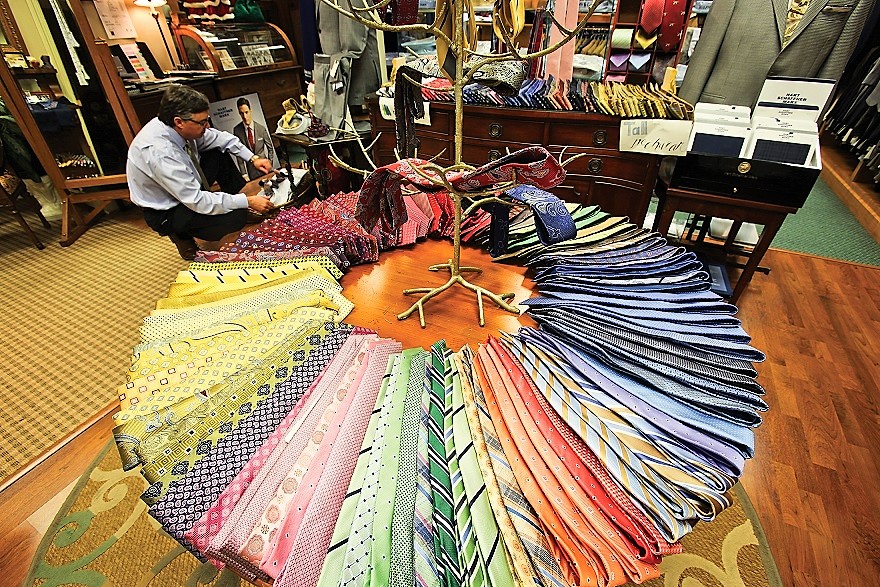
Bernard’s Store for Men is a retail institution in Jasper. (Meg McKinney / Alabama NewsCenter)
The walls of the 123-year-old beautifully restored building are lined with wooden chests, old desks, an ox yoke, a stuffed bobcat and pheasants, while Elvis Presley’s “Peace in the Valley” LP forever is cued to play on a Decca suitcase stereo in the entrance window.
A nattily attired man approaches a boy in his mother’s arms as they await a tuxedo for the dad. “You’re a good-looking guy,” Rusty Richardson says with a broad smile, which elicits the same from the boy. The owner of Bernard’s isn’t giving special treatment to this family: it’s the standard at one of Jasper’s oldest businesses.
“People like old-fashioned things,” says Richardson, who bought the business in 1988, not too long after having worked there part-time in his high school years. “Bernard Weinstein believed in top-notch customer service, in carrying top-quality lines and standing behind them. We’re carrying on that tradition.”
Nowadays a man off the street will be greeted with an ice-cold 8-ounce bottle of Coca-Cola, or a cup of coffee, and invited to take his time looking through the jam-packed rows of shirts, socks, slacks, suits and shoes.
“Our mission is to make people feel comfortable when they walk in the door,” Richardson says. “I try to remember people’s names, keep a list of their sizes, their kids’ sizes. And we’d love to help them buy something.”
Bernard’s Store for Men has been open nearly 70 years because exceptional service and selection “pays off,” Richardson says. Anything less than the best of each could not be competitive with nationally known clothing or chain stores. Richardson provides free alterations, gift wrapping and delivery.
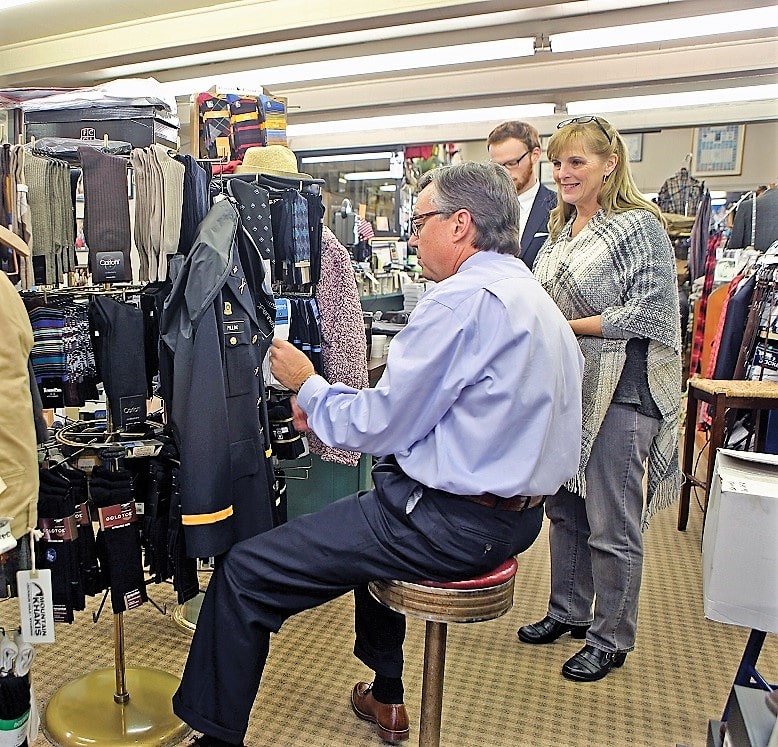
Customer Marci Pilling watches as Rusty Richardson makes adjustments to her son’s military uniform at Bernard’s Store for Men in Jasper. (Meg McKinney / Alabama NewsCenter)
“The other thing is we’re good listeners,” he says. “People just come here and hang out. They vent and I let them, and they know I won’t repeat what they say. We had four or five guys in here this morning, not buying anything, just shooting the bull.”
Richardson has four full-time and three part-time employees. He and Glenda Odom have worked together 43 years. He continues hiring local high school students through the same program that brought him into the business with Weinstein.
The hallway between the tailored clothing and furnishings building and the original Bernard’s is lined with Christmas card photographs of customers’ children sent in through the years; many of those pictured now frequent the store as adults. A framed portrait of Weinstein, tape measure draped around his neck, stands on an end table.
“We’ve been fortunate to stay open, and busy, only because of our loyal customers and repeat business,” Richardson says. “A lot of companies today are online and don’t want to see you eye to eye. That personal contact has made Bernard’s successful.”
Yoruzu new link to best-selling autos
What will a new Honda Ridgeline, Nissan Altima, Acura RDX, Mercedes M Class and Toyota Camry soon have in common? Each could depend on crucial elements built at a $117 million plant in Jasper.
Since July 2017, Yorozu Automotive Alabama employees have been making steel components at the 283,826-square-foot state-of-the-art facility, which is the Japanese corporation’s second U.S. manufacturing site. Yorozu has long been a major player in the auto parts world but in 2015 was enticed to Jasper, in part, because the town is at the geographical center of 10 car plants in the South. Yorozu specializes in suspension parts also found in the Nissan Maxima, Titan and NV van, and Honda Pilot.
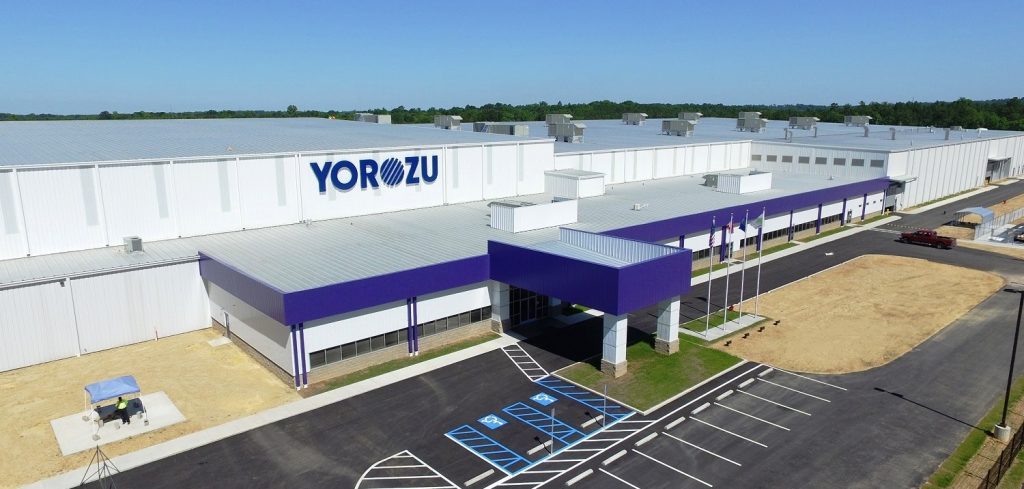
Japanese auto supplier Yorozu has invested $117 million in a Jasper facility that will have 300 workers. (Walker County Development Authority)
More than 160 employees, out of an anticipated workforce of some 300, already occupy the no-frills, white-walled building where “Safety First” is posted in every room, on each floor and flies alongside the American, Alabama and Yorozu flags out front. There are engineers, hydraulic press operators, painters, assembly and shop workers, maintenance personnel and administrators amidst scores of robots, conveyer belts, colossal cranes and computer screens.
“There’s quite a wide range of skills required to make this kind of operation work efficiently,” says Senior Vice President Reuben Byrom, who transferred with two other executives after he spent 24 years at Yorozu’s first American plant near Murfreesboro in his native Tennessee. “There’s a lot of opportunity for advancement within this company. You may start at the ground-floor level today, then, by applying yourself, end up in a management position.”
As Byrom walks a marked path along the concrete factory floor 55 feet beneath the roof, rolls of steel weighing 16,000-26,000 pounds are lifted onto a reel by one of four 20-ton overhead cranes. A 3,500-ton transfer press slams onto the thin, flat metal sheets, repeatedly popping out the beginnings of a rear suspension part. Interchangeable dies fill a large area of the floor, awaiting transfer inside the press for the different car parts produced by Yorozu employees.
Each pressed part goes through a series of refinements before becoming the finished products that have earned the parent company its stellar reputation during the past 70 years.
All raw materials come into the south end of the massive building and eventually exit as completed parts for shipping on the north end of the plant. Scores of steel hanging racks are filled with parts and transported by small, flat AGVs (automated guided vehicles) that scurry throughout the plant on computer-programmed routes. The battery-powered AGVs eliminate the use of manned forklifts. An overhead conveyer system moves the parts through the immersion painting section.
Although much of the plant is automated, the human touch is required for many of the important jobs. The facility has two eight-hour shifts five days each week, with most workers off on weekends. Their product will be shipped for final assembly of cars at plants in Alabama, Georgia, Mississippi and Tennessee.
“This plant is currently shipping well over 2 million parts annually and will easily double that as we reach full production,” Bryom says.
Bevill State a bargain for local students
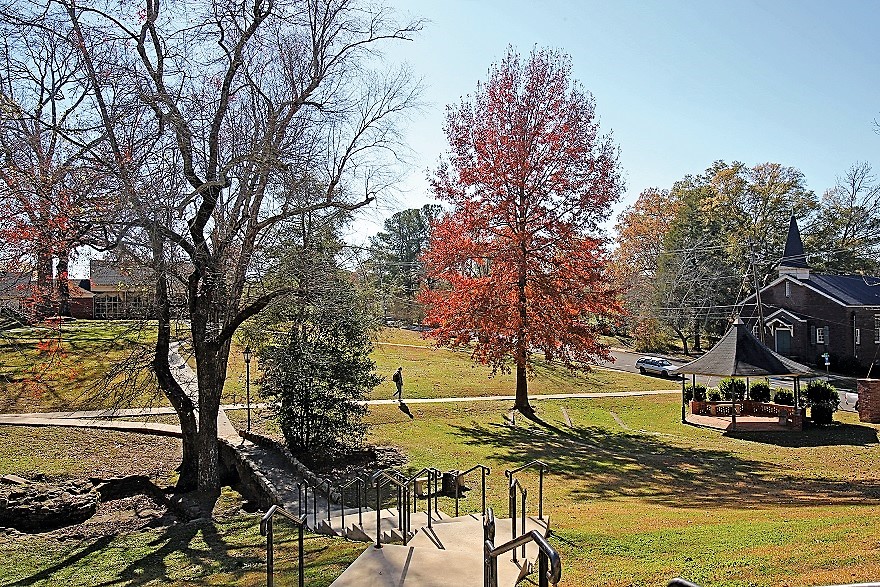
Bevill State Community College campus. (Meg McKinney / Alabama NewsCenter)
Nestled in a hilly, residential area, with a city park and scenic creek leading to its doorstep, Bevill State Community College’s Jasper Campus is easily the equal of the most picturesque schools statewide. From the stately Davis Hall and Murphy Hall at the entrance, to McCutcheon-Fair Hall at the back, the 17 buildings between Indiana and Gamble avenues provide local students an opportunity to further their learning without leaving town.
“It is a gorgeous campus,” says Tana Collins, PR director of the Bevill system’s oldest school. “And it saves students a lot of money, costing less than half the price of a four-year institution. A lot of times a student or their parents aren’t quite ready for a four-year college. Bevill State provides a seamless transfer after two years.”
Bevill State has agreements with four-year colleges, including Birmingham-Southern, UAB and the University of North Alabama, which guarantee that credits for courses completed in Jasper will transfer to the universities. “We make sure our students aren’t wasting their time or their money,” Collins says.
Nearly 700 students were on campus last fall, with more than 500 others taking Bevill State’s online courses. Top-performing local high schoolers can begin taking Bevill classes in the 10th grade, allowing some of them to begin college at the sophomore level.
Overall enrollment numbers are expected to soon grow, with welding courses moving from the nearby Bevill Sumiton campus to the new Rapid Training Center in the Jasper Industrial Park. The center received a $1.92 million grant from the Appalachian Regional Commission for retraining adult workers to help offset job losses from the declining coal industry.

Alabama Gov. Kay Ivey speaks during the ceremony at Bevill State Community College. (Karim Shamsi-Basha / Alabama NewsCenter)
Last year, the college established an apprenticeship program with Alabama Power and the International Brotherhood of Electrical Workers to award college credits for on-the-job training. This year will see the opening of the APC Heating, Ventilation and Air Conditioning Training Center, as the facility moves from its longtime home in Clanton.
“It’s not only a wonderful opportunity for Alabama Power Company, but for Jasper and Bevill State, as well,” Collins says. “All of the people training there will be staying here in hotels and eating in our restaurants, bringing a boost to our school and the local economy.”
Last year, the heralded basketball program returned after a five-year absence, with newly named mascot “Grizz Lee Bear,” chosen through an online voting campaign. The team gained national prominence under Glen Clem, who coached 1,000 games in 37 years before dying at age 59 in 1996. The Bevill gymnasium bears his name, as does the Alabama Junior College Coach of the Year award.
The Bevill baseball team, which won the state championship and finished well in the national junior college tournament in 2001 and 2003, this spring will play for the first time in six years.
“We have a long history of very successful athletics,” Collins says. “Everyone is excited to see that tradition return.”
Working together for the better
A concerted effort by nonprofit community groups has brought a brighter day for Jasper residents as new businesses open and opportunities abound. The past two years have seen more than 40 downtown renovations totaling $1.2 million, building purchases nearing $4 million and 17 new businesses creating 80 jobs. Bevill and Jasper industrial parks are home to 15 plants employing more than 500 workers.
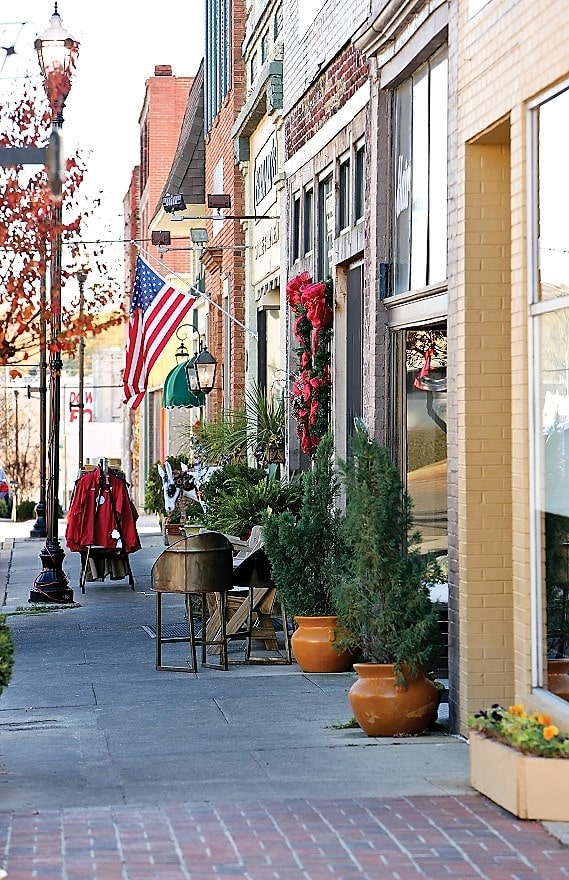
Downtown Jasper is experiencing a rebirth. (Meg McKinney / Alabama NewsCenter)
These successes derive from the efforts of the Jasper Main Street, Jasper Industrial Board, Chamber of Commerce of Walker County, Walker Area Community Foundation, Walker County Arts Alliance, Walker County Development Authority, local business leaders and elected officials working hand in hand to lift their community.
“I don’t think a lot of communities can tell you that all of their organizations work well together,” says Linda Lewis, who’s been president of the local chamber for 22 years. “I love partnerships and you don’t have such wide-ranging partnerships in a lot of places.”
Ironically, Lewis grew up getting Alabama Power customers’ lights back on. Her father, 87-year-old Energizer Chuck McKellar, in emergencies let his kids answer their home phone when folks called to say they had an outage. As a young girl, Lewis would call the Jasper Crew Headquarters and report the customer names and addresses. She later worked part-time in the Dora Office.
Today, Lewis tackles more and bigger issues, ones affecting the livelihood of her county’s 67,000 people. The chamber’s second consecutive five-year development plan, “Forward Walker County,” is targeting retail growth, workforce readiness, image and community engagement. Part of the plan involves Alabama Power’s Smith Lake and Dam, just outside Jasper, which is a destination for thousands of fishermen nationwide for fishing tournaments and to catch trout below the dam.
At the heart of the downtown renaissance is Main Street Executive Director Mike Putnam, who took the job three years ago after retiring as Corner High School’s theatre director. He grew up in Birmingham, remembers its previously successful downtown and has watched the current comeback, which became his ideal in making Jasper flourish again.
“Every downtown went bust,” Putnam says. “This whole revitalization now of big downtowns and small downtowns is because people connect with them. There’s no connection to a mall, though I have nothing against malls.”
Putnam says to recruit industry to Walker County, Jasper must have the vibrant downtown he recalls from his youth. Downtown is the heart that keeps a community beating, he says. Fortunately, the Main Street Jasper board has “very progressive” members who are working together to turn things around.
“We’re just in the middle of a great revitalization,” says Rusty Richardson of Bernard’s Store for Men. “We’re tickled to be here on the main square. There’s a lot going on downtown. The majority of the old buildings that were vacant for years have been bought and are now open with businesses operating.”
Jasper Alabama Power office serves 41,000
Jasper Manager Britton Lightsey was literally born into the Alabama Power family. His late grandfather, Bob Barrett, was business office manager in Columbiana. Britton’s father, Pete Lightsey, was a crew foreman in Centreville who retired after more than 40 years with the company. Britton’s brother, Trey Lightsey, is Environmental Affairs supervisor at the General Services Complex. Even Britton’s mother-in-law, Anita Davis, was a long-time customer service representative in the Columbiana Office.
“And that doesn’t even count my cousins, uncles and other relatives who’ve worked for Alabama Power,” Lightsey says at his desk in the downtown Jasper Office where he’s worked the past year.
The University of Montevallo graduate has worked across the state during his decade with the company since starting in the Montevallo Office in Appliance Sales. He worked about a year each in Calera and Clanton, before moving to Eufaula in the Professional Development Program. Lightsey became a business office supervisor in Montgomery in 2012, the business office manager in Winfield and Hamilton in 2013, then added Fayette and Sulligent to his plate through 2016.

At Alabama Power’s Jasper office are, back from left, Britton Lightsey, Brandi Porter, James Usrey, Dana Harbin, Steve Hart and Jeff Best, and front from left, Jonathan Thomas, Elizabeth Arnold and Mercedi McBrayer. (Meg McKinney / Alabama NewsCenter)
Customer Service Representative Dana Harbin has been with the company for 20 years, all but six of them in the Jasper Office. CSR Brandi Porter has been with APC for 11 years, all in Jasper except a short stint in the Tuscaloosa Office.
Working out front in the payment area, Customer Service Rep Steve Hart has been with the company for 19 years, while his counterpart Elizabeth Arnold’s first day on the job was Oct. 2, 2017.
“I love Jasper,” says Arnold. “It’s my home, always has been. I think anybody from the Jasper area would agree that it is a great place to live.”
Merchandise Salesperson Jonathan Thomas has been in the Jasper Office all 14 years he has been with APC, establishing a reputation as one of the company’s top salesmen. The store frequently finishes second in the state in total sales. Merchandise Salesperson Lisa Rushing splits her time between the Fayette Office and Jasper.
“We have to compete with national chain stores, but we focus on what we need to do to satisfy our customers,” says Thomas. “We take pride in everything we do. We greet our customers at the door, shake their hands and are honest about our products and prices. We sell service and value. Our customers appreciate knowing that we back up everything we sell.”
This story originally appeared in Alabama Power’s Powergrams magazine.
